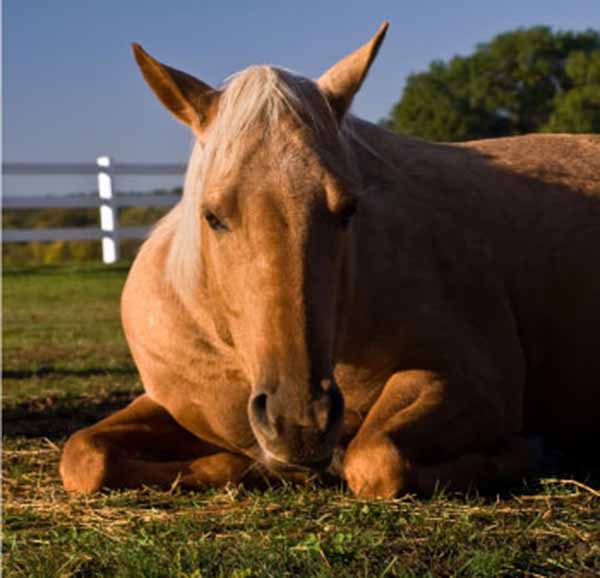Take the Quiz: How Will Your Horse’s Risk of Colic Change This Spring?
 By: Equine Guleph/Nicole Weidner
By: Equine Guleph/Nicole Weidner
Spring is the season of change. Unfortunately, horses aren’t great with change. Changes to a horse’s routine and diet can increase the risk of colic and are often overlooked as a potential cause. However, 80% of colic cases can be prevented with proper management strategies. Do your part to prevent colic this spring by learning more. Equine Guelph has a free Colic Tool (http://www.equineguelph.ca/Tools/colic.php) for horse owners that contains information on risk factors for colic, and tips for preventing colic from happening. There is also a quiz, called the Colic Risk Rater that will tell you how likely it is that your horse will colic.
Brandy’s Tale – From 11% to 50% chance of colic in One Day
Let’s look at an example to understand how changes can increase your horse’s chance of colic. Brandy’s a 10-year-old Palomino Quarter Horse mare with a penchant for sass. She spent the winter at a boarding facility for training (and managed to keep the sass intact) but is returning to her home farm this spring. The barns are an hour apart, so after trailering (which also increases colic risk), Brandy will have to deal with changes to:
HAY: She received unlimited mixed hay at the training facility and will switch to unlimited grass hay at home.
CONCENTRATE FEED: She was fed a concentrate feed to meet activity levels in the winter at the facility but will receive only a vitamin/mineral supplement at home.
WATER: Although she receives well water at both locations, horses are sensitive to differences in water odour and taste, which may cause reduced water intake.
TURNOUT TIME: She was stalled for 8 hours each night at the training facility but will be stalled for 10 hours each night at home.
STALL: She will be given her old stall at home, but this is still an adjustment from the stall she has spent the past winter in.
ACTIVITY: She was worked 5 days/week at the training facility but will be worked less intensely on only 2-3 days/week at home.
According to the Colic Risk Rater, there was an 11% chance that Brandy may colic while at the training facility. Now, in the 24-hour time period after Brandy returns to her home facility, there is a 50% chance that she may colic. There are things we can do to reduce this risk. Strategies like bringing water, hay and concentrate feed from the training facility and making a gradual transition to the feeds used at home will lessen the many changes that Brandy already has to adjust to.
Intercity Insurance Services Inc./CapriCMW Insurance Services Ltd. is the generous sponsor of the Colic Risk Rater Tool (http://www.equineguelph.ca/Tools/colic.php). Mike King, of Intercity Insurance, is a dedicated horseman who believes in the importance of education for horse owners. He addresses why it was so important for his organization to partner with Equine Guelph on this initiative, “Given our decades of experience in insuring horses from coast to coast, we know that colic is one of the highest risk factors for death in the Canadian herd. We can think of no better risk management tool to prevent colic than education.“
Do you know what your horse’s current risk of colic is? Have you thought how any changes you’re making this spring (like moving to a new facility) can increase your horse’s colic risk? Do you know what steps to take to reduce this risk? Find out the answers to these questions and more by visiting Equine Guelph’s Colic Risk Rater Tool (http://www.equineguelph.ca/Tools/colic.php).
Help us spread the word and educate your fellow horse owners! Share this article and tell us what chance your horse has of colic now or with future changes, and what you’re doing to reduce the risk!
Equine Guelph is the horse owners’ and care givers’ Centre at the University of Guelph in Canada. It is a unique partnership dedicated to the health and well-being of horses, supported and overseen by equine industry groups. Equine Guelph is the epicentre for academia, industry and government – for the good of the equine industry as a whole. For further information, visit www.equineguelph.ca.










